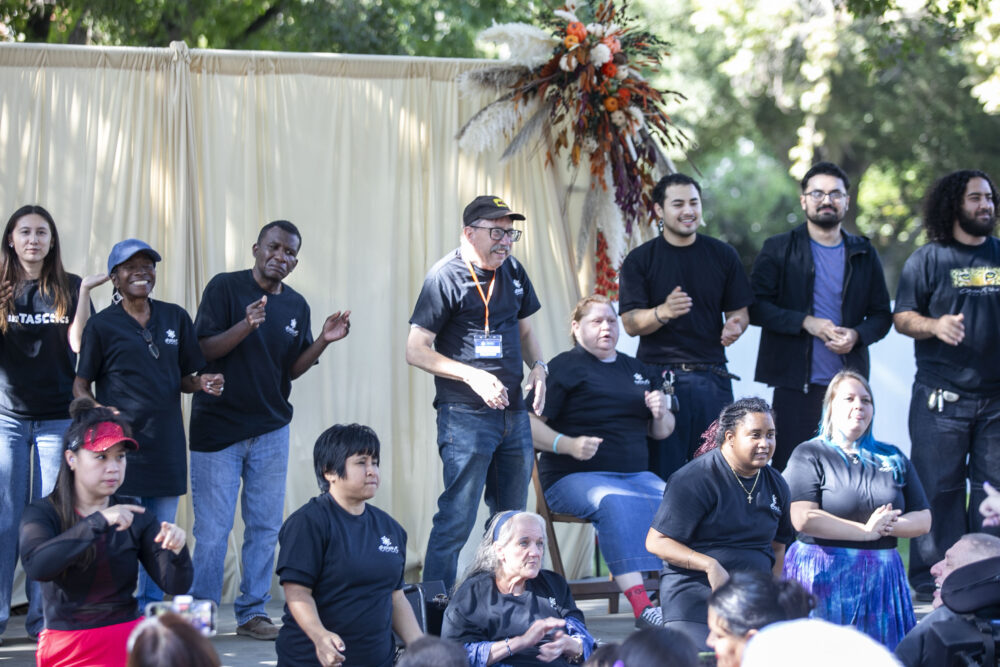
Nico De Guzman channeled being an auctioneer, as he quickly yelled for guests to purchase two tickets during Fall Festival on the Farm on Saturday.
As a part of The Adult Skills Center events crew in Canyon Country, De Guzman, 34, joined the nonprofit five months ago, and has enjoyed being a TASC employee to help create events for community members to enjoy.
“It’s been super fun. We went bowling. We do fun activities like the mall, or something cool like Garden Grove. I like the working environment. I like to carry big containers, helping these people out, I love it,” De Guzman said. “Halloween, Thanksgiving. It’s so much fun. My coworkers and peers are the best, they’re so nice.”
Expressing appreciation for his experience at TASC, De Guzman made sure to put in effort to ensure the event was a success.
The nonprofit organization, which serves individuals with intellectual and developmental disabilities, held its largest fundraiser in Sand Canyon for the third time, which included carnival games, rides, a petting zoo, a silent auction, and even a talent show put on by staff members and clients for attendees to enjoy.
Susan Congdon, development and communications manager, said it’s been rewarding to be part of the organization for the past three years.
“We have so many different programs to support them, like including them in the community, from employment services to independent living services, where we teach them skills like budgeting, meal planning, cooking, all the things that are in day-to-day lives,” Congdon said. “We hire clients, but we also work with local businesses to get them hired outside of TASC in the community. Our clients not just run our events, but they also work here. We have a janitorial crew. We have an events crew.”
Clients can also help take care of the animals, and participate in classes, such as woodshop, to learn practical skills, according to Congdon.
With six locations throughout the Santa Clarita Valley, San Fernando Valley, Antelope Valley and Mojave Desert, more expansion is on the horizon for TASC, according to Congdon.
“This work just touches my heart dearly, because I also have children that also have disabilities. When you see [the clients] on stage performing, you see their confidence they get from simply being able to participate with their peers. They have these opportunities that they wouldn’t otherwise get,” Congdon said.
Phil Britton, a board-certified behavior analyst who has worked for the organization for over two years, discussed the process of using procedures to gauge behaviors.
“We use science-based procedures to see where our behavior is at, what we need to enhance their environments, or any senior procedures to help them adjust into a community. A lot of the participants we work with are in group homes and don’t have a lot of contact with family. We almost become like a pseudo family to them,” Britton said.
Britton has seen “maladaptive behaviors,” such as crying or hitting with the age range the nonprofit works with, which is 22 and over, but said that clients appreciate the effort in being a “part of something.”
“A lot of times, we take behaviors that are rough — for example, we’ve had people pick up trash, and they’re like, ‘This is mine now.’ Possessions. They can start distinguishing between things that are useful and what’s trash, [and ask,] ‘What do I need to throw away?’ We then take that skill and ask, ‘What can we do with that?’ We try to take skills that they already have, increase them, and put them in places where they can feel like they’re doing something and are a part of the community,” Britton said.
Erik Flores, clinical director for the Santa Clarita and San Fernando Valley locations, began work with the nonprofit nine years ago during its inception of the Specialized Therapeutic Services program.
“It’s really groundbreaking in that it took a client demographic that was coming out of institutionalized settings, so lockdown facilities in the outskirts of [places like] the Coachella Valley, but a great piece of legislation passed and they [now] have to be immersed in our community. We want full integration,” Flores said. “Basically, this program specializes in providing services towards individuals that would otherwise go unserved because they don’t have the psychiatric nurses, intensive behavioral support or general nursing care.”
STS is the most intensive program in the organization, given that the patients often have a dual diagnosis in developmental disability and mental health, but TASC focuses on catering to the various needs of clients through other programs.
“The STS program is basically the most intensive support program that you could find anywhere in the country. Aside from that, if you begin to reduce the level of specialized support, then we have tiered systems. So the Community Integration Training Program, which is a basic, general day program, functions the same as the STS programs, minus the clinical support,” Flores said. “So, community integration, leisure activities, vocational training, residential services. Whatever that individual needs, we’re going to match them to their program.”



